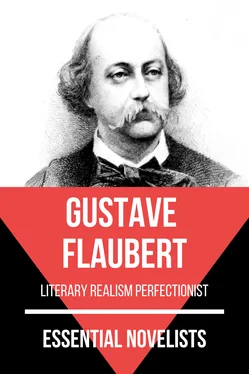Title Page
Author
Madame Bovary
Salammbô Конец ознакомительного фрагмента. Текст предоставлен ООО «ЛитРес». Прочитайте эту книгу целиком, купив полную легальную версию на ЛитРес. Безопасно оплатить книгу можно банковской картой Visa, MasterCard, Maestro, со счета мобильного телефона, с платежного терминала, в салоне МТС или Связной, через PayPal, WebMoney, Яндекс.Деньги, QIWI Кошелек, бонусными картами или другим удобным Вам способом.
About the Publisher Конец ознакомительного фрагмента. Текст предоставлен ООО «ЛитРес». Прочитайте эту книгу целиком, купив полную легальную версию на ЛитРес. Безопасно оплатить книгу можно банковской картой Visa, MasterCard, Maestro, со счета мобильного телефона, с платежного терминала, в салоне МТС или Связной, через PayPal, WebMoney, Яндекс.Деньги, QIWI Кошелек, бонусными картами или другим удобным Вам способом.

GUSTAVE FLAUBERT began his literary career at school, his first published work appearing in a little review, Le Colibri, in 1837. In November 1841 Flaubert was enrolled as a student at the Faculty of Law in Paris. At age 22, however, he was recognized to be suffering from a nervous disease that was taken to be epilepsy, although the essential symptoms were absent. This made him give up the study of law, with the result that henceforth he could devote all his time to literature.
Madame Bovary cost the author five years of hard work. Du Camp, who had founded the periodical Revue de Paris, urged him to make haste, but he would not. The novel, with the subtitle Moeurs de province (“Provincial Customs”), eventually appeared in installments in the Revue from October 1 to December 15, 1856. The French government then brought the author to trial on the ground of his novel’s alleged immorality, and he narrowly escaped conviction.
To refresh himself after his long application to the dull world of the bourgeoisie in Madame Bovary, Flaubert immediately began work on Salammbô, a novel about ancient Carthage, in which he set his sombre story of Hamilcar’s daughter Salammbô, an entirely fictitious character, against the authentic historical background of the revolt of the mercenaries against Carthage in 240–237 BC.
Flaubert died suddenly of an apoplectic stroke. He left on his table an unfinished page and notes for the second volume of his novel. Bouvard and Pécuchet, tired of experimenting, were to go back to the work of transcribing and copying that they had done as clerks.


––––––––
WE WERE IN CLASS WHEN the head-master came in, followed by a “new fellow,” not wearing the school uniform, and a school servant carrying a large desk. Those who had been asleep woke up, and every one rose as if just surprised at his work.
The head-master made a sign to us to sit down. Then, turning to the class-master, he said to him in a low voice—
“Monsieur Roger, here is a pupil whom I recommend to your care; he’ll be in the second. If his work and conduct are satisfactory, he will go into one of the upper classes, as becomes his age.”
The “new fellow,” standing in the corner behind the door so that he could hardly be seen, was a country lad of about fifteen, and taller than any of us. His hair was cut square on his forehead like a village chorister’s; he looked reliable, but very ill at ease. Although he was not broad-shouldered, his short school jacket of green cloth with black buttons must have been tight about the arm-holes, and showed at the opening of the cuffs red wrists accustomed to being bare. His legs, in blue stockings, looked out from beneath yellow trousers, drawn tight by braces, He wore stout, ill-cleaned, hob-nailed boots.
We began repeating the lesson. He listened with all his ears, as attentive as if at a sermon, not daring even to cross his legs or lean on his elbow; and when at two o’clock the bell rang, the master was obliged to tell him to fall into line with the rest of us.
When we came back to work, we were in the habit of throwing our caps on the ground so as to have our hands more free; we used from the door to toss them under the form, so that they hit against the wall and made a lot of dust: it was “the thing.”
But, whether he had not noticed the trick, or did not dare to attempt it, the “new fellow,” was still holding his cap on his knees even after prayers were over. It was one of those head-gears of composite order, in which we can find traces of the bearskin, shako, billycock hat, sealskin cap, and cotton night-cap; one of those poor things, in fine, whose dumb ugliness has depths of expression, like an imbecile’s face. Oval, stiffened with whalebone, it began with three round knobs; then came in succession lozenges of velvet and rabbit-skin separated by a red band; after that a sort of bag that ended in a cardboard polygon covered with complicated braiding, from which hung, at the end of a long thin cord, small twisted gold threads in the manner of a tassel. The cap was new; its peak shone.
“Rise,” said the master.
He stood up; his cap fell. The whole class began to laugh. He stooped to pick it up. A neighbor knocked it down again with his elbow; he picked it up once more.
“Get rid of your helmet,” said the master, who was a bit of a wag.
There was a burst of laughter from the boys, which so thoroughly put the poor lad out of countenance that he did not know whether to keep his cap in his hand, leave it on the ground, or put it on his head. He sat down again and placed it on his knee.
“Rise,” repeated the master, “and tell me your name.”
The new boy articulated in a stammering voice an unintelligible name.
“Again!”
The same sputtering of syllables was heard, drowned by the tittering of the class.
“Louder!” cried the master; “louder!”
The “new fellow” then took a supreme resolution, opened an inordinately large mouth, and shouted at the top of his voice as if calling someone in the word “Charbovari.”
A hubbub broke out, rose in crescendo with bursts of shrill voices (they yelled, barked, stamped, repeated “Charbovari! Charbovari”), then died away into single notes, growing quieter only with great difficulty, and now and again suddenly recommencing along the line of a form whence rose here and there, like a damp cracker going off, a stifled laugh.
However, amid a rain of impositions, order was gradually re-established in the class; and the master having succeeded in catching the name of “Charles Bovary,” having had it dictated to him, spelt out, and re-read, at once ordered the poor devil to go and sit down on the punishment form at the foot of the master’s desk. He got up, but before going hesitated.
Читать дальше















